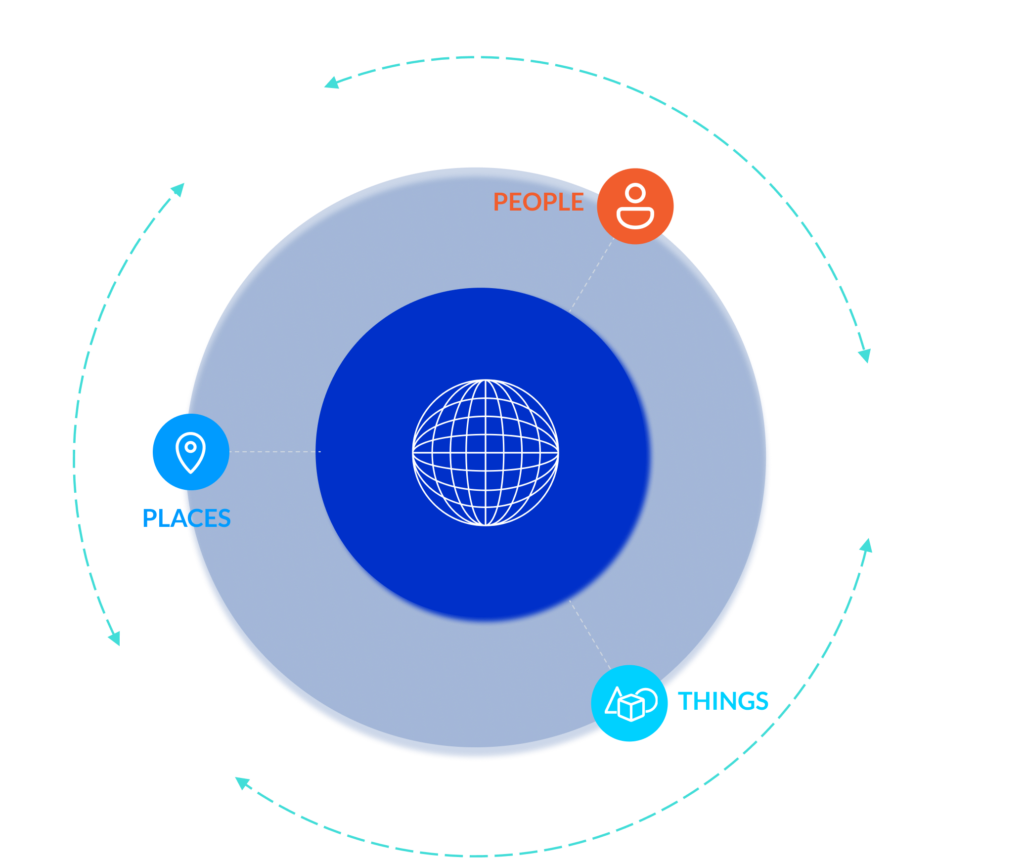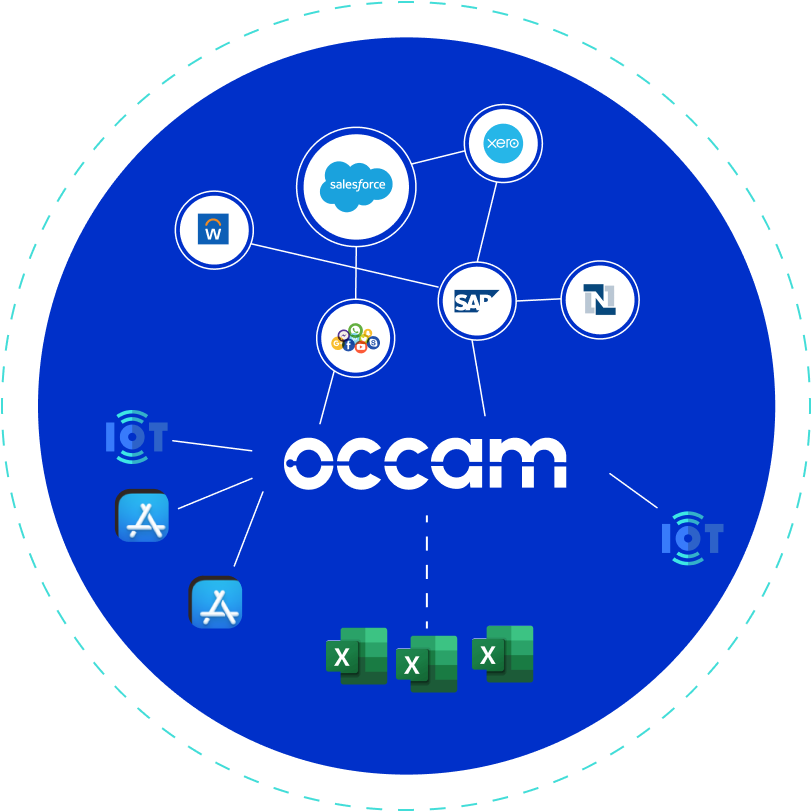Stop failing to accurately model your world inside another provider’s fixed world view. Quickly unify your unstructured data into an information system that solves your problems once and for all, without the bespoke overheads.

Data unified across three major systems in ten days; 50 new business processes; integrated with inventory hardware; warehouse management system finally unjammed.

IoT data platform built for ML/AI; v1.0 in three weeks; corrects anomalies across IoT data; unified with external and internal datasets; deep new meaning in source data.

National Kauri Dieback data platform emerged from a two-week unification of 100+ Excel files across multiple government agencies and local councils; accessible, adaptable solution.
Why Occam?
Data is made difficult. You’re drowning in the complexities and inefficiencies of your systems. Mismanaged and inconsistent data is blocking insightful decision-making while draining valuable resources.
The Occam platform
Unlock your competitive advantage currently buried in hundreds of spreadsheets and isolated apps. You can finally:
Your absolute focus can be data accuracy rather than being compromised by the built-in deficiencies in specific app-first systems.
For you, the foundation of your robust system is in the integrity and precision of the data. The presentation layer is auto-generated based on your accurate data model.
Whether you need ordinary 1-to-1 relationships or the intricacies of multiple relationships, Occam supports both at any stage in the lifecycle.
The flexibility given to you in data relationship-building removes the need for constant hacks and workarounds.
You need data consistency. Built on first principles, you can be sure to receive a uniform experience.
When compliance is paramount, take confidence in ongoing regulatory adherence by design.

The Occam Framework
The Occam framework does not push you in one direction and force pre-defined relationships on you.
When building your world:
Your problem has been solved.
Features
The unique features of the Occam platform stem from the first principle that no entity in your system should ever be duplicated.
The Occam platform mirrors the real world and records the lifecycles—start and end dates and times—of each entity, an absolute requirement for accurate reliable data modelling.
All entities share the same UDM across multiple industries including supply chain, engineering, environmental management, and social change.
The Occam UDM eliminates the risks of bespoke development through an established data model that works for any known business process.


Typical business process templates and modules come standard. Occam templates recognise your problem has unique requirements, so they are designed as genuinely useful starting points.
The Occam platform is truly relational (not a fixed hierarchy), allowing for all entities to be related to any other entity. Whatever entity you look at can pivot to the top of the hierarchy.
The UI, business layer, reporting, mobile app, API and data import is auto-coded, typically in 100k- 200k lines of code. At $10 per line of code, that's a saving of $1-2m in bespoke development.
Features
The unique features of the Occam platform stem from the first principle that no entity in your system should ever be duplicated.


The Occam platform mirrors the real world and records the lifecycles—start and end dates and times—of each entity, an absolute requirement for accurate reliable data modelling.
All entities share the same UDM across multiple industries including supply chain, engineering, environmental management, and social change.
The Occam UDM eliminates the risks of bespoke development through an established data model that works for any known business process.
Typical business process templates and modules come standard. Occam templates recognise your problem has unique requirements, so they are designed as genuinely useful starting points.
The Occam platform is truly relational (not a fixed hierarchy), allowing for all entities to be related to any other entity. Whatever entity you look at can pivot to the top of the hierarchy.
The UI, business layer, reporting, mobile app, API and data import is auto-coded, typically in 100k- 200k lines of code. At $10 per line of code, that's a saving of $1-2m in bespoke development.
FAQ
Occam can be hard to pin down. But yes, you can do what you can imagine.
Yes. Occam plays that role. As a low-code data platform, Occam is used to create and serve information systems that solve the most complex problems unique to every organisation.
The Occam platform has a database, a business process layer, and a user interface for data entry. It also imports data through APIs, and is especially good for IoT devices.
Occam is business and industry agnostic and designed to ensure that data is accurate at the moment it is created or imported.
Yes. Occam can play that role. However the concept of data warehousing is changing due to the high cost of maintenance. Operation data and reporting data is merging and Occam leads the way here.
Occam is an operational information system which means it creates data through data entry and data import. Because it is meta-data driven, it also auto creates the reporting data.
Yes. However, we think that CRM is not a suitable metaphor for the enterprise, as it focuses only on the sales cycle of leads, prospects, and deals. This is not relevant for many B2B relationships, for example, partnerships.
We believe a metaphor around stakeholder relationships is better. Our stakeholder module allows you to manage and customise your relationships and specialised processes across the enterprise.
Yes.
Smaller companies find Occam valuable as their single information system up to the point of the accounting cycle. This includes sales and relationships, logistics, and internal relationships. Organisations that use Occam to control all their data remove a key barrier to growth.
For larger organisations with mothership systems (e.g. ERP, CRM), Occam is the ideal platform to add flexibility to those systems. The Occam platform maintains the same controls as the slow-moving mothership while enabling you to get things done with great speed and agility.
What is common across all customers is that Occam manages that special data that is unique to you – your intangible asset – and we make it accessible and usable so you can change your world.
Yes. Though more importantly, the common theme we see with Occam customers is that they have a critical mission, and the mission includes a data problem others cannot solve and is blocking their progress.
You might be the CIO with too many isolated apps and legacy systems. Or you’ve succumbed to an organisation in Excel hell.
You might be the CEO’s special projects person. You’re often charged with resolving internal governance issues or external compliance requirements.
You will find Occam is often the perfect tool for the job.
Yes. The starting point for creating an Occam information system is knowing that it will need to change as your understanding of your business changes.
Because Occam is a truly data-first platform (not the typical app-first), data quality, flexibility, and accuracy is at the centre of its entire design.
Occam is a leader at enabling organisations to continuously unify their unstructured data sitting in thousands of excel files and dozens of siloed apps. And where each problem solved is reducing the complexity of the next.
Yes. Occam is a web application that uses the browser to access and update the data. It also auto-generates a mobile app.
Because Occam produces truly data-first information systems, we allow for, and expect, third party vendors to create applications on top of the Occam platform.
Web and mobile developers can create beautiful business process specific applications that use the single layer of the Occam platform.
Yes. There certainly are various low-code systems now available. And yes, they are mostly elegant, beautifully designed systems. However, their priority and focus is UI functionality, not data quality.
Occam recognises that accurate, reliable, reusable, and reportable data is the primary requirement of any information system.
Occam is the only low-code system that focuses on data quality.
Yes. At Occam, we only use in-house implementation experts.
We realise other platforms allow for third party implementation or self-service. However, we have seen on too many occasions that the data outcome from this work has critical show-stopping faults.
The work we do revolves around creating accurate reliable data so, before handover, we provision our expertise.
Yes. The likelihood of failure and ongoing blowouts is very high, no matter the industry.
Occam exists to remove the risk of bespoke development, while knowing that every enterprise needs to develop important in-house systems to manage their unique point of difference and their rapidly changing business processes.
Yes. But with one large acknowledgement: there is no artificial intelligence or business intelligence without data intelligence (DI).
“Garbage In, Garbage Out” is an immutable law that AI does not overcome. If an enterprise wants analytics that are going to help change the world, then DI comes first. That is where Occam helps.
3 min read · May 14
MacDonald’s Law
White’s law essentially suggests that if you get the data.. structure right, the code will be easier to create and maintain. MacDonald’s Law provides the how..
3 min read · Apr 04
The Data-Centric Paradox
As with many things IT, definitions of words and phrases are often incomplete, ambiguous and sometimes just wrong. Someone gives something…
3 min read · Mar 15
App-centric vs data-centric
There is a lot of talk recently about the data centric enterprise. In this article we’re going to look at the differences between…